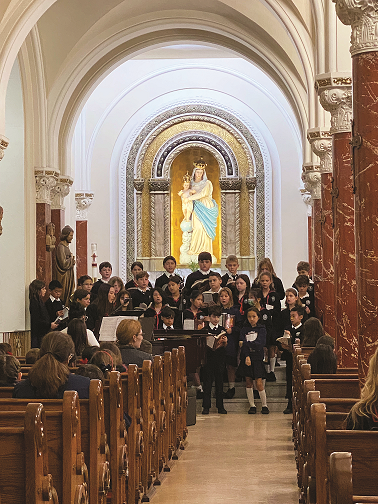Catholic education is a spiritual work of mercy

By Archbishop Salvatore J. Cordileone
Students in our Catholic schools are, no doubt, familiar with the corporal works of mercy. Many of the classrooms I visit have posters on display which list them: feeding the hungry, giving drink to the thirsty, clothing the naked, sheltering the homeless, visiting the sick and imprisoned, and burying the dead. Living out the corporal works of mercy is an indispensable part of Christian discipleship (Mt 25:31-45), and Catholic education is an education in living the works of mercy. Catholic schools are one of the ways that the Church lives her mission to be, as Jesus was, the “Incarnation of Mercy in the world.” (Pope Francis, general audience, Oct. 12, 2016). Our Catholic schools excel at forming men and women who are instruments of God’s mercy in the world through the many service opportunities in which our students participate, such as food and clothing drives, visiting the homebound and elderly, and writing Christmas cards to the sick and the imprisoned. Less widely known, however, are the spiritual works of mercy: counseling the doubtful, instructing the ignorant, admonishing the sinner, comforting the sorrowful, forgiving injuries, bearing wrongs patiently, and praying for the living and the dead. “Instructing,” that is teaching: teaching is a spiritual work of mercy. The spiritual works of mercy are perhaps less widely known because they are more difficult to live out in today’s world. Doing so might even bring Christians into conflict with the values of the world. In a culture that sees truth as something private – “my truth” and “your truth” – to claim to teach the truth can be seen as an offense against one’s individuality. Similarly, a culture that does not regard anything as a sin will view offering correction and even forgiveness as offensive.
Our Lord’s last commandment to His disciples was to teach, as recorded for us at the end of St. Matthew’s Gospel: “Go, therefore, and make disciples of all nations, baptizing them in the name of the Father, and of the Son, and of the Holy Spirit, teaching them to observe all that I have commanded you” (Mt 28:19-20). This is what we know as the “Great Commission,” to teach the nations all that He taught, so that they can become His disciples, too. Pope Benedict reminded educators that Catholic education is a spiritual work of mercy. “Tradition has seen teaching,” he said, “as a concrete manifestation of spiritual mercy, which constitutes one of the first works of love which is the Church’s mission to offer to humanity” (Address to the participants in the plenary meeting of the Congregation for Catholic Education, Jan. 21 , 2008). “Teaching all nations” is an essential part of the mission of the Church, and, therefore, of Catholic schools. Students in Catholic schools come to value the truth, not as something individual and private and not as an abstraction, but as a person to be encountered, Jesus Christ, who is “the Way, the Truth and the Life” (Jn 14:6). As our schools live the example of Jesus through corporal works of mercy, may we recall that the Church’s ministry of teaching is a work of mercy, too.
As this issue of Catholic San Francisco magazine is the last Catholic Schools edition of Pam Lyons’ tenure as superintendent of Catholic schools for the Archdiocese, I would like to take this opportunity to express my profound gratitude to her for her service to our schools, our families and the young people the Lord has entrusted to our care. Ms. Lyons served for three years as an associate superintendent in the Department of Catholic Schools before stepping into the role of superintendent, where for the past seven years she has kept a steady hand at the helm and guided our schools through challenges such as demographic shifts and a global pandemic. I am especially grateful for her leadership and courage in prioritizing in-person education in our archdiocesan schools during the pandemic. When many children around the world were forced to stay home, Catholic schools in San Francisco, San Mateo and Marin counties were the first to reopen under her leadership. If you have the opportunity, please offer Ms. Lyons a word of thanks for the ways in which she was an “incarnation of mercy” during her time as superintendent. May Christ the Teacher continue to lead and bless her vocation wherever He calls her.
This column was originally printed in the January 2024 issue of Catholic San Francisco magazine.

